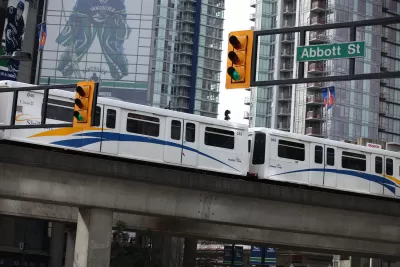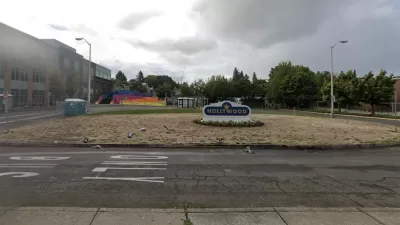Jarrett Walker examines the desirability of slow transit as argued by University of British Columbia Professor Patrick M. Condon in support of a vast streetcar network for Vancouver.

Walker inserts himself into the Broadway rapid transit debate in Vancouver to prove a point about the value of slow versus rapid transit. Walker picks his fight with Condon, who proposes building a streetcar network for Vancouver, rather than extending the city's existing driverless metro system, SkyTrain, to his own campus, UBC, which lies at the western tip of the city. While the Portland Streetcar, which Condon praises as a model system, did little for that city's mobility, it did much for infill redevelopment, acknowledges Walker.
Was that a unique case though? "Is it really true, as Condon suggests, that sustainable urban form, with fine-grained mixtures of uses that permit most of life's needs to be met close to home, will grow better around slow transit, like a streetcar, as opposed to something fast like a subway?" asks Walker.
"As I think about the great urban spaces I've seen, at many scales, on many continents, I am simply not convinced that highly civilized urban places benefit from transit being slow When I think of really healthy, vibrant, exciting neighborhoods in Europe, or in New York City, I think of places with subway stations," argues Walker. "Once people are used to rapid transit, it comes to function as a driving force in determining where people can live at high density, and enables the continued growth of highly sustainable dense urban form."
Thanks to Jessica Hsu
FULL STORY: is speed obsolete?

Alabama: Trump Terminates Settlements for Black Communities Harmed By Raw Sewage
Trump deemed the landmark civil rights agreement “illegal DEI and environmental justice policy.”

Study: Maui’s Plan to Convert Vacation Rentals to Long-Term Housing Could Cause Nearly $1 Billion Economic Loss
The plan would reduce visitor accommodation by 25% resulting in 1,900 jobs lost.

Planetizen Federal Action Tracker
A weekly monitor of how Trump’s orders and actions are impacting planners and planning in America.

This Toronto Suburb Has More Bus Riders Than Columbus, Ohio
Brampton, Ontario used gradual improvements in service to prove that if you build it, they will ride.

Paris Bike Boom Leads to Steep Drop in Air Pollution
The French city’s air quality has improved dramatically in the past 20 years, coinciding with a growth in cycling.

Why Housing Costs More to Build in California Than in Texas
Hard costs like labor and materials combined with ‘soft’ costs such as permitting make building in the San Francisco Bay Area almost three times as costly as in Texas cities.
Urban Design for Planners 1: Software Tools
This six-course series explores essential urban design concepts using open source software and equips planners with the tools they need to participate fully in the urban design process.
Planning for Universal Design
Learn the tools for implementing Universal Design in planning regulations.
Smith Gee Studio
Alamo Area Metropolitan Planning Organization
City of Santa Clarita
Institute for Housing and Urban Development Studies (IHS)
City of Grandview
Harvard GSD Executive Education
Toledo-Lucas County Plan Commissions
Salt Lake City
NYU Wagner Graduate School of Public Service




























